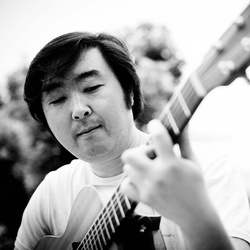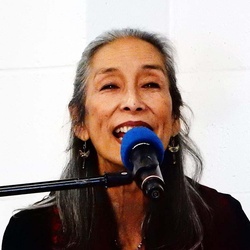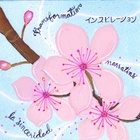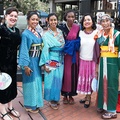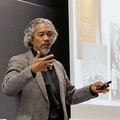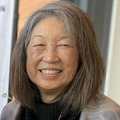This being the first month of a new year, I thought we’d present “poetics” with a different approach from any other edition of the column—to feature lyrics of two songwriters of different generations and share a bit of their music to boot. For January 2020, we have a song from a brilliant musician, Goh Nakamura, who now hails from Little Tokyo, and a classic from a true legend, Nobuko Miyamoto.
We’re also including links to some tracks for you to hear some of their work.
With a surely formidable year ahead, we could all use the inspiration of some meaningful and beautiful music. Enjoy.
—traci kato-kiriyama
* * * * *
Goh Nakamura is a singer, songwriter, musician, composer and actor. His music has been featured in films directed by Ridley Scott such as A Good Year, American Gangster and Body of Lies. His track "Daylight Savings" also appears in the film Feast of Love. Nakamura made his acting debut in Dave Boyle's award-winning film, Surrogate Valentine, where he played a fictionalized version of himself. The film screened at a number of festivals including the SXSW Film Festival and Nakamura won a Special Jury Prize for Acting from the Dallas International Film Festival for his performance in it. In 2017, Goh was commissioned by the Philadelphia Asian film festival to compose a score for the 1919 silent film “The Dragon Painter” featuring Sessue Hayakawa. Most recently, Goh scored the music for the Bruce Lee Documentary “Be Water” which premiered at the Sundance 2020 Film Festival.
Hold on to your Humanity
I never thought I’d have to say it
I never thought it’d come to this fate
hands on the clock
they blur the timeline
next thing you know
it’s just too late
hold on to your imagination
hold on to your hopes and dreams
hold on to your humanity
you can let go of the other things
and I never thought I’d have to say it
I always thought it was common sense
am I the optimist or the cynic?
just depends on when you ask me, I guess
But hold on
to your imagination
hold on to your hopes and dreams
hold on to your sense of wonder
hold on to your humanity
you can let go of the other things
Hold on to your Humanity
Hold on
Onto a hand that needs it
when we're losing our grip
at least we'll have hope at our fingertips
Hold on to your imagination
Hold on to your hopes and dreams
Hold on to your sense of wonder
Hold on to your Humanity
Hold on to your Imagination
Hold on to your hopes and dreams
Hold on to a hand that really needs it
Hold on to your Humanity
You can let go of the other things
Can't believe I have to tell you these things
Hold on to your Humanity
* This song is copyrighted by Goh Nakamura (2020).
* * * * *
Nobuko Miyamoto found her song in the whirlwind of change during the 70’s birth of the Asian American movement. Capturing the spirit of that moment was album “A Grain of Sand,” created with Chris Iijima and Charlie Chin. As troubadours their music galvanized young Asians and built bridges between Latino, African and Native Americans. In 1978 she established Great Leap to create musicals, concerts and music videos to tell the Asian American story. Nobuko now produces FandangObon, a festival that engages communities with participatory music and dance from Mexican Fandango, Japanese Obon, West African, and Sufi traditions to deepen relations, share environmental knowledge, and connect with Mother Earth.
PS: Nobuko is just completing a double album for Smithsonian Folkways: WHAT CAN A SONG DO?, to be released in August 2020.
We Are the Children (Iijima, Miyamoto, 1970)
We are the children of the migrant worker
We are the offspring of the concentration camp
Sons and daughters of the railroad builder
Who leave their stamp on America
We are the children of the Chinese waiter
Born and raised in the laundry room
We are the offspring of the Japanese gardener
Who leave their stamp on America
Sing a song for ourselves
What have we got to lose
Sing a song for ourselves
We’ve got the right to choose
We’ve got the right to choose
Foster children of the Pepsi generation
Cowboys and Indians – ride red men ride!
Watching war movies with the next door neighbor
Secretly rooting for the other side
Sing a song for ourselves
What have we got to lose
Sing a song for ourselves
We’ve got the right to choose
We’ve got the right to choose
We are the cousins of the freedom fighter
Brothers and sisters all around the world
We are a part of the Third World People
Who will leave their stamp on America
Who will leave their stamp on America
Who will leave their stamp on America, America!
* This song is copyrighted by Nobuko Miyamoto (1970).
© 1970 Nobuko Miyamoto; 2020 Goh Nakamura




